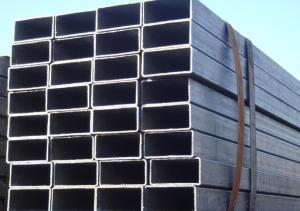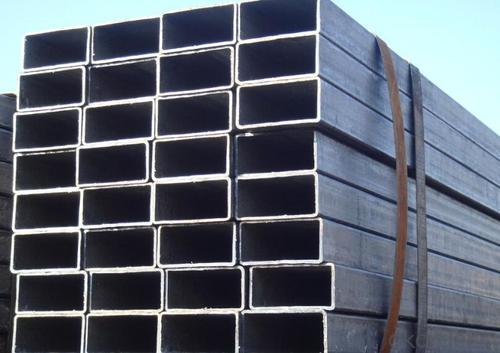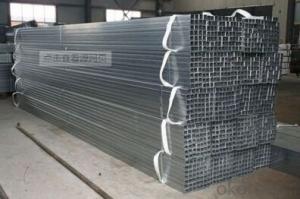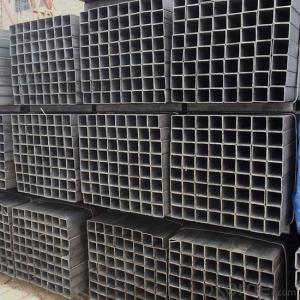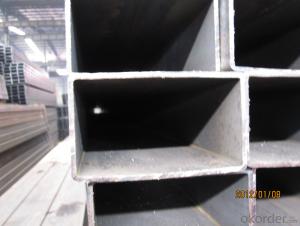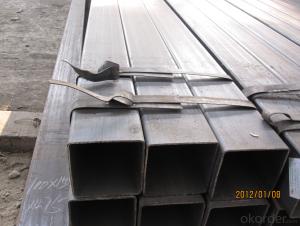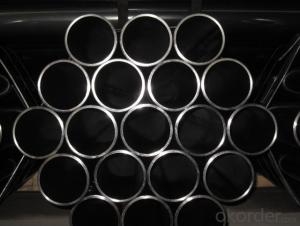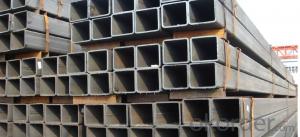Rectangular Hot Rolled Carbon Steel Tube 2
- Loading Port:
- China main port
- Payment Terms:
- TT or LC
- Min Order Qty:
- 100 m.t.
- Supply Capability:
- 10000 m.t./month
OKorder Service Pledge
OKorder Financial Service
You Might Also Like
1.Quick Details
Thickness: | 1.0 - 35 mm | Section Shape: | Square | Outer Diameter: | 20*20-600*600 |
Place of Origin: | Shandong China (Mainland) | Secondary Or Not: | Non-secondary | Application: | Structure Pipe |
Technique: | Cold Rolled | Certification: | CE | Surface Treatment: | oil,paint |
Special Pipe: | Thick Wall Pipe | Alloy Or Not: | Non-alloy | Name: | Square Hollow Steel Pipe/Tube |
Shape: | Square/Rectangular | Yield Strength: | 360-380Mpa | Tensile Strength: | 560-580Mpa |
Elongation: | 24-28% | Bend Test: | Qualified | Impact Value: | V-notch |
Grade: | 20#,45#,16Mn,A210,St45,Q235,Q345,Q195,Q215,10#-45#,A53-A369,ST35-ST52,Q195-Q345 | Standard: | JIS G3465-2006,JIS G3466,GB/T 3094 |
2.Specifications
1. OD:15X15-800X800MM,20X30--600X800MM
2. Thick.:1.0--35.0MM
3.FAQ of Rectangular Steel Tube
①How is the quality of your products?
Guaranteed: If products’ quality don’t accord to discription as we give or the promise before you place order, we promise 100% refund.
②How about price?
We quote as lowest as possible for any customer, and discount can be given according to quantity”,if you like bargain and factory price is not low enough as you think, just don’t waste your time.Please trust the quotation we would give you, it is professional one.
③Why should you chose us?
Chose happens because of quality, then price, We can give you both.Additionally, we can also offer professional products inquiry, products knowledge train(for agents), smooth goods delivery, exellent customer solution proposals.SGS test is available, customer inspection before shipping is welcome, third party inspection is no problem.
If you have any question, pls feel free to contact us !
4.Rectangular Hot Rolled Steel Tube Image
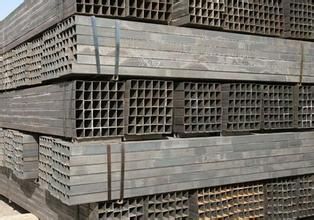
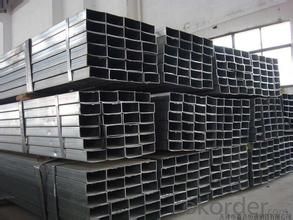
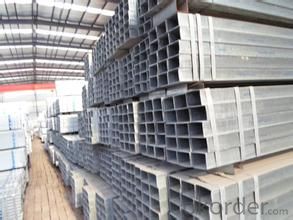
- Q: Can steel pipes be used for underground stormwater drainage?
- Indeed, underground stormwater drainage can utilize steel pipes. These pipes possess durability and boast a high strength-to-weight ratio, rendering them appropriate for subterranean usage. They can endure substantial burdens and fend off corrosion, thus guaranteeing sustained effectiveness within stormwater drainage systems. Furthermore, steel pipes lend themselves to easy welding, facilitating customization and flexibility during both design and installation. Nonetheless, it is imperative to implement adequate corrosion protection measures, such as the application of a protective coating or the utilization of corrosion-resistant alloys, to avert degradation over time. Regular maintenance and monitoring are also advisable to uphold the pipes' integrity and ensure optimal stormwater drainage functionality.
- Q: What is the impact toughness of steel pipes?
- The impact toughness of steel pipes refers to the ability of the material to withstand sudden or high-velocity impacts without fracturing or breaking. It is a measure of the material's resistance to cracking under dynamic loading conditions. The impact toughness of steel pipes is an important property as it determines their ability to withstand accidental impacts or external forces during transportation, installation, and operation. The impact toughness of steel pipes is typically evaluated using standardized tests such as the Charpy V-notch test or the Izod test. These tests involve striking a notched sample of the steel pipe with a pendulum or a falling weight and measuring the energy absorbed by the material before it fractures. The impact toughness is then calculated based on this energy absorption. A high impact toughness is desirable in steel pipes as it indicates a greater ability to absorb energy and resist fracture, making them more resistant to sudden impacts or loading conditions. This is particularly important in applications where steel pipes are used in high-stress environments, such as in oil and gas pipelines, automotive components, or structural applications. Various factors can affect the impact toughness of steel pipes, including the chemical composition, heat treatment, and microstructure of the steel. For example, alloying elements like manganese, chromium, and nickel can enhance the impact toughness by promoting the formation of fine-grained microstructures and preventing the propagation of cracks. Similarly, proper heat treatment processes such as quenching and tempering can improve the impact toughness by optimizing the material's microstructure and mechanical properties. In summary, the impact toughness of steel pipes is a crucial property that determines their ability to withstand sudden or high-velocity impacts. It is evaluated through standardized tests and is influenced by factors like chemical composition, heat treatment, and microstructure. A high impact toughness is desirable in steel pipes to ensure their structural integrity and resistance to fracture under dynamic loading conditions.
- Q: How are steel pipes classified according to their wall thickness?
- Steel pipes are classified according to their wall thickness into various categories such as standard, extra strong, and double extra strong.
- Q: What are the factors that affect the lifespan of steel pipes in different environments?
- The factors that affect the lifespan of steel pipes in different environments include the pH level of the surrounding soil or water, presence of corrosive chemicals, humidity and moisture levels, exposure to extreme temperatures, mechanical stress or pressure, and the quality of protective coatings or corrosion inhibitors applied to the pipes.
- Q: How are steel pipes used in the oil and gas pipeline transportation?
- Steel pipes are widely used in the oil and gas industry for pipeline transportation due to their durability, strength, and resistance to corrosion. These pipes are specifically designed to withstand high pressure and transport various types of fluids, including crude oil, natural gas, and refined petroleum products. In oil and gas pipeline transportation, steel pipes are primarily used for three main purposes: gathering, transmission, and distribution. Gathering pipelines are responsible for collecting oil and gas from the production wells and transporting them to processing facilities. Steel pipes are used in these pipelines due to their ability to withstand the harsh conditions of the extraction sites and effectively transport the fluids over long distances. Transmission pipelines are used to transport oil and gas over vast distances, sometimes spanning across countries or continents. Steel pipes are ideal for this purpose as they can handle high pressure, ensuring the efficient flow of fluids over long distances. These pipes are often buried underground or submerged in water to protect them from external elements and minimize the risk of damage. Distribution pipelines are responsible for delivering oil and gas to end-users, such as homes, businesses, and industrial facilities. Steel pipes are commonly used in these pipelines as they can handle the varying demand and pressure requirements of different consumers. These pipes are often smaller in diameter compared to transmission pipelines but still provide reliable and safe transportation of oil and gas to their final destinations. In addition to their strength and durability, steel pipes used in oil and gas pipeline transportation are also coated or lined with various materials to enhance their resistance to corrosion and minimize the risk of leaks. These protective coatings and linings ensure the longevity of the pipes and maintain the integrity of the transported fluids. Overall, steel pipes play a crucial role in the oil and gas industry by providing a reliable and efficient means of transporting oil and gas from production sites to processing facilities and ultimately to end-users. Their durability, strength, and resistance to corrosion make them an ideal choice for pipeline transportation in this industry.
- Q: Can steel pipes be used for underground geothermal systems?
- Yes, steel pipes can be used for underground geothermal systems. Steel pipes are commonly used in geothermal systems due to their strength and durability. They can withstand the high temperatures and pressures associated with geothermal energy extraction and distribution. Steel pipes also have good corrosion resistance, which is important when dealing with the underground environment and the various minerals and chemicals present in the ground. Additionally, steel pipes are versatile and can be easily joined and installed underground, making them a suitable choice for geothermal systems.
- Q: Which is better, galvanized steel pipe or stainless steel?
- Most of the use requirements are to maintain the original appearance of the building for a long time. In determining the type of stainless steel to be chosen, the main consideration is the aesthetic standards required, the corrosivity of the atmosphere in the area, and the cleaning system to be adopted. However, other applications increasingly seek only structural integrity or watertightness. For example, the roof and side walls of industrial buildings. In these applications, the construction cost of the owner may be more important than the aesthetic, the surface is not very clean can also. The use of 304 stainless steel in a dry indoor environment is quite effective.
- Q: Can steel pipes be used for underground power transmission?
- Yes, steel pipes can be used for underground power transmission. Steel pipes are commonly used for underground power transmission due to their durability, strength, and resistance to corrosion. They provide a reliable and secure conduit for transmitting power underground while protecting the electrical cables from external elements.
- Q: What are the different grades of steel used in pipes?
- The different grades of steel used in pipes include carbon steel, alloy steel, stainless steel, and duplex stainless steel.
- Q: How are steel pipes protected from damage during transportation?
- Steel pipes are protected from damage during transportation through various methods. One common method is the use of protective coatings. Steel pipes are often coated with materials such as epoxy, zinc, or polyethylene to create a barrier between the pipe and external elements. These coatings help to prevent corrosion and damage during transit. Furthermore, steel pipes are often bundled together and secured using straps or bands. This bundling helps to keep the pipes in place and prevents them from shifting or rolling during transportation. Additionally, padding or cushioning materials such as foam or rubber may be used to provide extra protection and minimize the risk of damage from impact or vibration. In some cases, steel pipes may be placed in crates or containers to provide additional protection. Crates are designed to fit the pipes snugly and provide a secure enclosure that prevents external forces from causing damage. Containers, on the other hand, offer a protective environment for the pipes, shielding them from the elements and potential impacts. To ensure the safe transportation of steel pipes, it is also important to consider proper handling and loading techniques. Pipes should be carefully lifted and loaded onto transport vehicles using appropriate equipment, such as cranes or forklifts, to minimize the risk of damage. Proper securing of the pipes within the transport vehicle is crucial to prevent movement and potential damage during transit. Overall, a combination of protective coatings, bundling, padding, and secure packaging or loading techniques are employed to safeguard steel pipes from damage during transportation. These measures help to ensure that the pipes arrive at their destination in optimal condition, ready for use in various applications.
Send your message to us
Rectangular Hot Rolled Carbon Steel Tube 2
- Loading Port:
- China main port
- Payment Terms:
- TT or LC
- Min Order Qty:
- 100 m.t.
- Supply Capability:
- 10000 m.t./month
OKorder Service Pledge
OKorder Financial Service
Similar products
Hot products
Hot Searches
Related keywords
